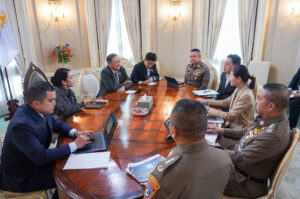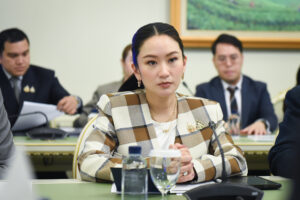แถลงการณ์พรรคเพื่อไทย เรื่อง ขอให้ทบทวนกระบวนการเรียกค่าเสียหายในโครงการรับจำนำข้าว และยกเลิกการใช้มาตรา 44 โดยไม่เป็นไปตามเจตนารมณ์ของรัฐธรรมนูญ
ตามที่หัวหน้า คสช. ได้ดำเนินการเพื่อเรียกค่าเสียหายทางแพ่ง
กับอดีตนายกรัฐมนตรี รัฐมนตรี และผู้เกี่ยวข้องในโครงการรับจำนำข้าว และได้ใช้อำนาจตามมาตรา
44 ของรัฐธรรมนูญฉบับชั่วคราว ออกคำสั่งหัวหน้า คสช. ที่ 56/2559 ลงวันที่ 13
กันยายน 2559 ให้อำนาจกรมบังคับคดี ในการใช้มาตรการบังคับทางปกครองด้วยการยึด
อายัด และขายทอดตลาดทรัพย์สินของผู้ต้องรับผิดในโครงการรับจำนำข้าว
ขณะเดียวกันกลับคุ้มครองการปฏิบัติหน้าที่ของเจ้าหน้าที่ที่เกี่ยวข้องในการดำเนินการดังกล่าว
ให้ไม่ต้องรับผิด จากที่เคยออกคำสั่งหัวหน้า คสช.ที่ 39/2558
คุ้มครองการปฏิบัติหน้าที่ของเจ้าหน้าที่ดังกล่าวมาครั้งหนึ่งแล้ว นั้น
พรรคเพื่อไทยเห็นว่า
ได้มีความพยายามอย่างต่อเนื่องของรัฐบาลและหัวหน้า คสช. ที่จะมุ่งเอาผิดกับอดีตนายกรัฐมนตรีและผู้ที่เกี่ยวข้องให้ต้องรับผิดชดใช้ค่าเสียหายกรณีโครงการรับจำนำข้าวให้ได้
โดยไม่สนใจกระบวนการและขั้นตอนของกฎหมาย
โดยเห็นได้ชัดเจนจากคำให้สัมภาษณ์ของนายกรัฐมนตรีและหัวหน้า คสช.
และรองนายกรัฐมนตรีที่เกี่ยวข้อง
ที่พยายามชี้นำสังคมและชี้นำการปฏิบัติหน้าที่ของเจ้าหน้าที่ให้เห็นว่าบุคคลเหล่านั้นได้กระทำความผิดและต้องรับผิดชดใช้ค่าเสียหายโดยเร็ว
จนถึงขนาดใช้อำนาจพิเศษตามมาตรา 44 ของรัฐธรรมนูญเปลี่ยนแปลงหลักเกณฑ์ของกฎหมายปกติที่ใช้บังคับทั่วไป
เพื่อนำมาใช้กับกรณีนี้เป็นการเฉพาะ ซึ่งพรรคเพื่อไทยได้พิจารณาแล้วเห็นว่า
การดำเนินการดังกล่าวเป็นการลุแก่อำนาจสร้างความไม่ชอบธรรมแก่ผู้ที่ถูกกล่าวหา
และเป็นการเลือกปฏิบัติที่ไม่เป็นธรรม ด้วยเหตุผลดังนี้
1.
โครงการรับจำนำข้าว
ได้มีการฟ้องคดีอาญาต่อศาลฎีกาแผนกคดีอาญาของผู้ดำรงตำแหน่งทางการเมืองขณะนี้คดีอยู่ระหว่างการพิจารณาของศาล
ซึ่งศาลจะเป็นผู้ตัดสินว่าผู้ที่เกี่ยวข้องมีความผิดหรือไม่
หากตัดสินว่ามีความผิดจึงควรจะมาพิจารณาถึงความรับผิดทางแพ่งต่อไป
ไม่ควรที่ผู้นำจะออกมาชี้นำสังคมและชี้นำการพิจารณาคดีของศาลรายวันก่อนที่ศาลจะมีคำพิพากษา
2.
โครงการรับจำนำข้าวเป็นนโยบายของรัฐบาลเพื่อให้การอุดหนุนด้านการเกษตร (Agricultural Subsidies)
แก่เกษตรซึ่งเป็นภาคที่อ่อนแอ และเป็นชนกลุ่มใหญ่ของประเทศอันถือเป็นการทำเพื่อประโยชน์ของชาวนาส่วนรวม
ซึ่งการดำเนินการเรียกค่าเสียหายจากการดำเนินนโยบายของรัฐบาล ถือเป็นครั้งแรกของประเทศที่นำเรื่องกำไรขาดทุนมาพิจารณาและเรียกค่าเสียหายจากผู้นำรัฐบาลก่อน
ทั้งที่ทุกรัฐบาลก็มีการดำเนินการในทำนองเดียวกันมากมายหลายโครงการ
และเป็นแนวปฏิบัติที่นานาชาติได้ใช้กันโดยทั่วไป
3.
การเรียกค่าเสียหายจากโครงการรับจำนำข้าว
เป็นเรื่องของนโยบายรัฐบาลไม่ใช่การทำละเมิดทั่วไป เช่น
การทำให้ทรัพย์สินของราชการเสียหาย หรือการยักยอกเงินของทางราชการที่จะสามารถกำหนดค่าเสียหายและความรับผิดได้ชัดเจน
ดังนั้นการดำเนินนโยบายรับจำนำข้าวจะถือเป็นการละเมิดหรือไม่ก็ยังไม่มีความชัดเจน
นอกจากนั้นการยึด อายัด และขายทอดตลาดทรัพย์สินของบุคคล ถือเป็นการกระทำที่กระทบต่อสิทธิในทรัพย์สินของบุคคล
จึงไม่ควรที่จะต้องเร่งรีบ รวบรัดในการกำหนดค่าเสียหาย และเรียกให้บุคคลเหล่านั้นต้องรับผิดจนกว่าศาลจะมีคำพิพากษาในคดีอาญาเสียก่อน
อันจะทำให้มีความชัดเจนว่าบุคคลใดมีความผิด และต้องรับผิดหรือไม่
4.
การอ้างว่า หากไม่เร่งดำเนินการ คดีอาจขาดอายุความนั้นก็ไม่เป็นความจริง เพราะเมื่อเรื่องดังกล่าวยังไม่ชัดเจนว่าผู้ถูกกล่าวหาได้กระทำความผิดหรือไม่
จึงเท่ากับยังไม่รู้ตัวผู้ต้องรับผิด อายุความจึงยังไม่เริ่มต้น
แต่การยกข้ออ้างดังกล่าวก็เพื่อเร่งรัดให้มีการเรียกค่าเสียหายให้จบทันอายุของรัฐบาลนี้
อันเป็นเจตนาทางการเมือง และเป็นการชี้นำกระบวนการยุติธรรมจากอคติของผู้นำที่มาจากการยึดอำนาจ
5. การออกคำสั่งหัวหน้า คสช. ไม่ว่าฉบับที่
39/2558 หรือฉบับที่ 56/2559 โดยให้ความคุ้มครองเจ้าหน้าที่ที่เกี่ยวข้องในการเรียกค่าเสียหายทางแพ่งให้ไม่ต้องรับผิด
และให้อำนาจกรมบังคับคดี ใช้มาตรการบังคับทางปกครอง
แทนที่จะเป็นปลัดกระทรวงการคลังตามที่กฎหมายกำหนดไว้นั้น จะส่งผลให้การปฏิบัติหน้าที่ของเจ้าหน้าที่ไม่ได้คำนึงถึงความถูกต้องเป็นธรรมเพราะถือว่ามีกฎหมายคุ้มครอง
แต่กระทำเพื่อให้บรรลุเจตนาของผู้นำเท่านั้น จึงเท่ากับเป็นการเลือกปฏิบัติโดยไม่เป็นธรรม
ขัดต่อหลักความเสมอภาค อันถือเป็นการละเมิดสิทธิมนุษยชนตามที่กำหนดไว้ในรัฐธรรมนูญ
ปฏิญญาสากลว่าด้วยสิทธิมนุษยชนแห่งสหประชาชาติ
และกติการะหว่างประเทศว่าด้วยสิทธิพลเมืองและสิทธิทางการเมืองซึ่งประเทศไทยมีพันธกรณีตามกฎหมายที่ต้องปฏิบัติตาม
6.
มาตรา 44 เป็นสิ่งที่มีมาโดยมิชอบด้วยหลักการประชาธิปไตยและหลักนิติธรรม
แต่เป็นสิ่งที่หัวหน้า คสช. เขียนให้อำนาจตนเองไว้
อันเป็นอำนาจซึ่งไม่ได้มาจากความยินยอมของประชาชน การใช้อำนาจดังกล่าวจึงควรเป็นไปอย่างจำกัดเฉพาะตามองค์ประกอบและเงื่อนไขที่รัฐธรรมนูญบัญญัติไว้เท่านั้น
กรณีการออกคำสั่งข้างต้นไม่เข้าหลักเกณฑ์ที่จะใช้อำนาจตามมาตรา 44 ได้
เพราะการออกคำสั่งคุ้มครองการปฏิบัติหน้าที่ของเจ้าหน้าที่ และการให้อำนาจกรมบังคับคดียึดอายัดทรัพย์บุคคลเป็นการเฉพาะนั้น
ไม่ได้เป็นไปตามเงื่อนไขที่กำหนดไว้ในรัฐธรรมนูญ และข้ออ้างในคำสั่งนั้นแต่อย่างใดเลย
นอกจากนี้ผู้ออกคำสั่งจะต้องคำนึงถึงความชอบธรรมเป็นด้านหลักด้วย
จึงเป็นที่ประจักษ์ชัดว่า
คสช.และรัฐบาลปัจจุบันล้วนเป็นผู้ไม่เห็นด้วยกับนโยบายจำนำข้าว
ดังนั้นจึงถือเป็น “ผู้มีส่วนได้เสีย” “เป็นคู่ขัดแย้ง” และมิใช่
“ผู้เป็นกลาง” การที่พยายามจะดำเนินคดีเรียกร้องค่าเสียหายกับอดีตนายกฯ
ยิ่งลักษณ์และผู้เกี่ยวข้องในคดีจำนำข้าวด้วยวิธีการใช้
“คำสั่งทางปกครอง” โดยไม่เลือกใช้กระบวนการฟ้องร้องเป็นคดีแพ่ง จึงเป็นการกระทำที่ไม่ชอบและขัดหลักนิติธรรม
อีกทั้งอาจทำให้เข้าใจได้ว่าเป็นความพยายาม และ/หรือมีความจงใจที่จะใช้กระบวนการต่างๆ
เพื่อมุ่งทำลายพรรคการเมืองและผู้นำทางการเมืองที่มีความคิดเห็นต่าง
ซึ่งเท่ากับจงใจทำลายระบอบประชาธิปไตยในสังคมไทยนั่นเอง
พรรคเพื่อไทยจึงขอเรียกร้องให้หัวหน้า
คสช. และรัฐบาลได้ดำเนินการทุกอย่างให้เป็นไปตามขั้นตอนตามกฎหมายปกติ ไม่ควรใช้อำนาจพิเศษตามรัฐธรรมนูญ
มาตรา 44 มุ่งใช้บังคับเพื่อเร่งเอาผิดกับบุคคลเป็นการเฉพาะ
และการดำเนินการของเจ้าหน้าที่รัฐต้องเป็นไปตามหลักความเป็นธรรม และความรับผิดชอบตามกฎหมาย ไม่ควรยกเว้นหรือคุ้มครองความรับผิด
จึงขอให้มีการทบทวนกระบวนการเรียกค่าเสียหายในโครงการรับจำนำข้าว
และยกเลิกการใช้มาตรา 44 โดยไม่เป็นไปตามเจตนารมณ์ของรัฐธรรมนูญ
จึงแถลงมาเพื่อทราบโดยทั่วกัน
พรรคเพื่อไทย
25 กันยายน 2559
PHEU THAI
PARTY STATEMENT
REQUEST
TO RECONSIDER THE PROCEDURES TO SUE FOR
COMPENSATION
FOR LOSSES IN THE RICE-PLEDGING SCHEME
AND
TO REVOKE THE USE OF SECTION 44
AS
IT IS NOT IN THE SPIRIT OF THE CONSTITUTION
The
Chief of the National Council for Peace and Order (NCPO) took action to call
for compensation from the former Prime Minister, the Ministers and those
involved in the rice-pledging scheme and invoked Section 44 of the interim
constitution to issue the order No. 56/2559 on September 13, 2016 authorizing
the Legal Execution Department to force the Administration to seize, confiscate
and auction the properties of those charged for their roles in the
rice-pledging scheme. At the same time,
the NCPO Chief also issued the order No. 39/2558 that grants protection to
officials involved in handling the case.
Pheu
Thai Party sees that the government and the NCPO Chief has clear intention to
implicate the former Prime Minister and those involved to bear responsibility
for losses from the rice-pledging scheme without following legal
procedures. This was made clear from the
interviews given by the Prime Minister and NCPO Chief and the Deputy Prime
Minister, leading the public and the officials involved to believe that the
accused had committed crimes and would have to pay compensations as soon as
possible. The special power issued under
Section 44 of the interim constitution was invoked in lieu of the regular laws
specifically for this case. Pheu Thai
Party deems that such action is an abuse of authority, discriminates and
creates unfairness to the accused due to the following reasons:
1. The
rice-pledging scheme case has been filed to the Supreme Court’s Criminal
Division for Holders of Political Positions and is awaiting court ruling. If the court rules that the defendants are in
the wrong, then civil liability lawsuit proceedings may be filed against
them. It is inappropriate for leaders to
lead the society into making conclusions before the court has announced its
ruling.
2. The
rice-pledging scheme was the government’s policy to provide agricultural
subsidies to support the famers who form a large and vulnerable sector of the
Thai populace. The aim was to assist the
farmers as a whole. This is the first
case of its kind where the government is being sued for compensations and where
profit and loss is cited as the reason for the lawsuit. The former head of
government is also being sued as the prime defendant even though there have
been several projects of similar nature taken by all past governments and by
governments of other countries.
3. Filing
for losses from the rice-pledging scheme is a matter that relates to the government
policy; it is not an act of violation
such as the causing of destruction to government property or embezzlement of
government funds for which the violations and exact amounts can be determined. Moreover, seizure, confiscation and auction
of individual properties are to be considered infringements of individual
rights. The process to ascertain the
amount of compensations against the accused should not be done in a rush but
should await the criminal court’s ruling which will give clear indication on
those who will be formally charged and those who will not.
4. By
claiming that the case needs to be expedited as the statute of limitation may
expire is a false claim. It is still
unclear whether the accused are in the wrong and as such, it cannot yet be
determined as who the wrong-doers are so the legal process should not begin
till then. By citing this as a pretext
to expedite the compensation process, to be done within the tenure of this
government, is a prejudiced view with a political intention by those that came
to power through the coup d’état.
5. By
issuing the order No. 39/2558 or No. 56/2559, the NCPO Chief had granted
protection to officials involved in filing the civil liability lawsuits for the
compensations and had empowered the Legal Execution Department to force the
Administration to take action in lieu of the Permanent Secretary of the
Ministry of Finance, as stipulated by law. This will allow the officials
involved to take actions without regard to the rule of law as they will be
protected and the actions they take will only be to achieve the aims of those
in power. Therefore these actions may be
discriminatory and unfair and go against the equality principle as stated in
the Constitution, the United Nation’s
Universal Declaration of Human Rights and the International Covenant on Civil
and Political Rights for which Thailand has legal obligations to abide by the
rules.
6. Section 44 of the interim constitution was
not written on the principles of democracy and rule of law. It was written by the NCPO Chief for his own
means so the powers granted by this Section did not come from the people’s
consent. Invoking the use of this power
should then be within the principles and conditions set in the
Constitution. The orders that were
issued by the NCPO chief, as stated above, do not come under the conditions
that may invoke the use of Section 44, as granting protection to the officials
handling the case and empowering the Department of Legal Execution to seize and
confiscate personal properties do not fall within the conditions stipulated in
the Constitution, nor to the pretext used for issuing those orders. Moreover, the persons who issued these orders
must also consider if this is done with righteousness.
It
is clear that the NCPO and the present government are not in favor of the rice-pledging scheme. As such, they are considered to be “a stakeholder”, “a conflicting partner” and
not “an impartial party” in
this situation. By trying to sue the
former Prime Minister Yingluck and those involved in the scheme through the
“directives of the Administration” rather than through the civil
lawsuit process is unfair and goes against the rule of law. This may lead to the understanding that there
are attempts and/or intentions to use various means to destroy political
parties and political leaders that have different opinions, which amounts to
having intentions to destroy the democratic system of the Thai society.
Pheu Thai Party calls on the Chief of
the NCPO and the government to follow all normal legal procedures and not to invoke
the use of the special powers under Section 44 of the interim constitution to
force to expedite the process in order to implicate certain persons. Also, state officials should carry out their
duties with fairness and with regard to the rule of law so there should be no
exception or protection for their actions.
Therefore, we request that the procedures to sue for compensation for
the rice-pledging scheme is to be given a reconsideration and that the use of
Section 44 is to be revoked as it is not within the spirit of the Constitution.
This statement is for information.
Pheu Thai Party
September 25, 2016







